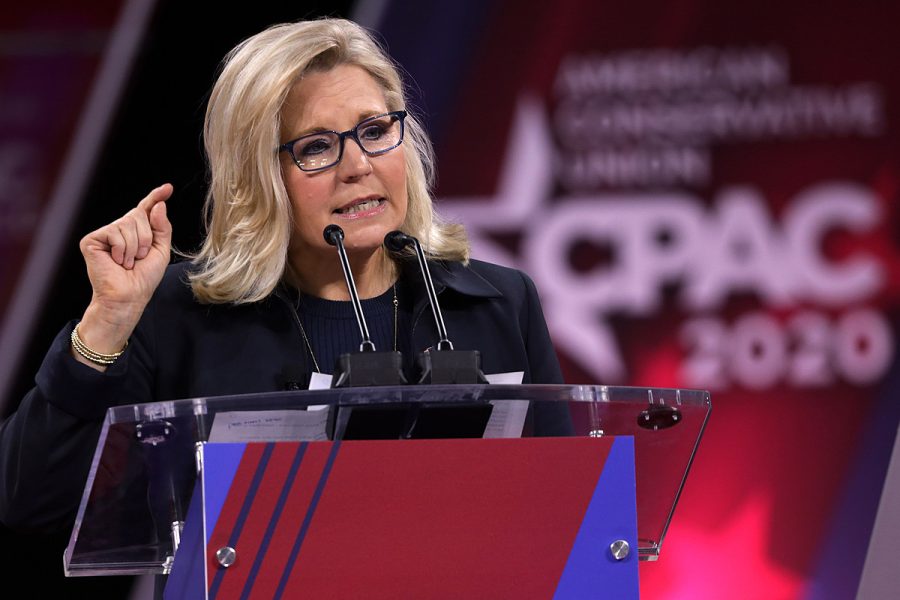Liz Cheney defended democracy; she lost her job for it
The Wyoming congresswoman was a rising star in the GOP until she voted to impeach former President Donald Trump
Liz Cheney speaks at the 2020 Conservative Political Action Conference.
August 31, 2022
On Aug. 16, 2022, the fierce conflict between former President Donald Trump and Rep. Liz Cheney finally came to a head in Wyoming’s GOP primary election. Cheney, who once chaired the House Republican Conference, lost by a stunning 37 points to Trump-backed challenger Harriet Hageman. Hageman is now the Republican candidate up for election to represent Wyoming’s At-Large congressional district.
Just two years ago, this loss would have come as a shock to both Republicans and Democrats across the nation. Cheney, who formerly held the third-highest position in House Republican leadership and is the daughter of a former Vice President, was a force to be reckoned with within the GOP. Having been sworn in in 2017, the Republican up-and-comer rapidly climbed the ranks to head the House Republican Conference just two years later. When she refused to vote to decertify the results of the 2020 election in integral swing states and exhibited her opposition to Trump, Cheney cemented herself as Trump’s highest-profile Republican opponent.
She did this while also willingly angering her constituents in her home state of Wyoming, a state that gave Trump 70% of the vote in 2020. To add further insult to injury, she voted to impeach former President Trump for inciting an insurrection following the Jan. 6 riots and served as vice chair of the select committee investigating these attacks.
“Two years ago, I won this primary with 73% of the vote.” Cheney said. “I could easily have done the same again.”
And she’s right.
Realistically, Cheney knew this was going to happen. Trump won the state she represented by almost 70% of the vote both times he ran, and Cheney voted with him 93% of the time over the course of her career, per FiveThirtyEight. Cheney could easily have chosen to align herself with Trump and therefore retain the favor of the state of Wyoming. She acknowledged this in her concession speech. However, she also acknowledged that what the choice would have required from her was incredibly egregious.
“The path was clear,” she said. “But it would have required that I go along with President Trump’s lie about the 2020 election. It would have required that I enable his ongoing efforts to unravel our democratic system and attack the foundations of our republic. That is a path I could not and would not take.”
After suffering this overwhelming defeat, Cheney hinted at a potential run for president in an interview on NBC’s Today Show. The representative revealed that she was considering becoming a Republican challenger to former President Trump’s “4 more in 24” campaign. By doing this, she has inadvertently made herself the face of one of the largest voting blocs keeping Trump from reassuming the presidency— the “Never Trump” Republicans.
Winning is a long shot for Cheney despite being from her family’s Republican dynasty — the state of Wyoming has demonstrated that. But if she runs, Cheney will redirect a large proportion of Republican voters who aim to vote red and cannot accept Trump’s candidacy. Cheney essentially represents the moderate Republicans— her centrist views and complex political history make her somewhat of a red counterpart to Joe Biden. Considering the fact that she is still on the select committee and another hearing is upcoming in September, Cheney still retains the ability to disparage Trump by recommending criminal charges.
Cheney has consistently been a controversial figure in American politics throughout her career. She praised the Supreme Court’s decision to strike down Roe vs. Wade, endangering the right to an abortion despite 61% of Americans expressing support for the precedent (PBS). This was seemingly not the most democratic stance she could have taken. In addition to this, she voted for the bipartisan gun safety bill in June, despite the state of Wyoming ranking second in the nation for gun ownership and a majority of House Republicans opposing the bill. However, her forthright criticisms of a candidate her constituents adore so much demonstrate her own limits and her unwillingness to undermine the precedent of democracy in which she believes so strongly. Whether you agree with her or not, Liz Cheney has exhibited bipartisan respect towards the democratic process, respect which desperately needs to return to American politics.























